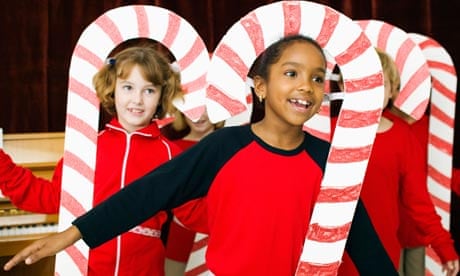With the summer term heading towards its close – and, for some, already done and dusted – school halls have been packed with rehearsals for the traditional end-of-year school play. Nervous children will be pacing, proud parents will be charging up the batteries on their video cameras and practising tight close-ups on their little darlings.
Everyone remembers their first time treading the boards. For most people, it's in the school nativity. Despite my obvious yearnings to perform from a very young age (I'd write mini-plays for friends to act out, sneakily casting myself in the lead role), as the only non-white and Muslim in a C of E school, my dad thought it best for me to not get involved in the nativity ("You'll get confused," he said).
By the time Charlie and the Chocolate Factory rolled around in the first year of junior school, I was desperate for my moment in the spotlight. Having studied all the options, I'd gone up for Veruca Salt – I wasn't keen on Violet Beauregarde's gum chewing. Even as an eight-year old, I could sense the teachers' nervous shuffling; multicultural casting was something they hadn't yet contended with in a small Yorkshire village school in the 1980s. I waited nervously through their whispered debate before the decision was handed down – I'd be perfect as an Oompa Loompa. Despite the disappointment of being classed as "chorus" and of having no lines (I didn't really class "Oompa Loompa dip a dee dah" as a line), I still remember the thrill of the lights going down and knowing that my mum was there to watch.
Roald Dahl's influence on the genre is clear; a straw poll among friends reveals I'm not the only Oompa Loompa and that there are also several Aunt Spiker and Aunt Sponges among us. For those who went to schools with bigger costume budgets and braver teachers, Bugsy Malone was a key choice, while the 80s high-school stage comedy favourite was often Gregory's Girl. I'm surprised to hear that many teachers choose to go with a Shakespeare play for kids as young as 10; my school didn't tackle the Bard on stage until sixth form, when it could be given that extra layer of gut-wrenching teen angst.
The school play is the first time most of us experience doing drama; the chance to actually embody a character rather than purely watching or reading one. It's that first opportunity to both test your performance skills and witness the teachers have a nervous breakdown.
Sport was always put on a pedestal for showing what you could achieve beyond your school desk, but as a child who barely managed to inflate my pyjamas in lifesaving let alone win the 100m, the school play was my way to shine. I found it more inclusive than sport; even if you can't or won't perform for the proud parents, there is always a role for you in costume or set design.
Following my Chocolate Factory debut, I was determined to overcome any potential awkward casting issue next time around. I was also excelling in class in reading aloud and I knew I had to use this to my advantage. Come the auditions for Pinnochio, I didn't hesitate; it was narrator or nothing. As I stood in the line of children in front of the teachers, I realised I was the only girl going for the part. Panic overwhelmed me; what if, in my determination to find non-racially specific parts, I'd overlooked gender issues and would now discover that only boys were allowed to be narrators?
But with none of the teachers saying anything to confirm my fears and boy after boy stepping forward only to fumble his lines and stumble over trying to pronounce Geppetto, it was time to get professional. I stepped forward, took a deep breath and went for it. A week later I found myself fiercely arguing with my mum about the level of bling in the dress she'd made me to wear while narrating – black with heavy gold thread running through it (there's no option for "plain" occasionwear in an Asian household).
Recently, I watched a play at the National Theatre's Connections project, a national festival of new writing and young theatre making. The sheer joy that acting and connecting to the audience gave to the young performers was palpable. For those lucky enough to take performing beyond the school gates and into youth theatre like this, there is boosted confidence, a sense of purpose and of course a potential future arts career all for the taking.
I never had the opportunity of doing youth theatre so the school play was my first and most influential connection with drama. Despite the obvious disappointment of first being cast as a short, orange creature, I didn't let it deter me from eventually attempting theatre professionally. (I had my first play, My Dutiful Laundrette, produced earlier this year and I'm now working on two new plays.)
I kept the black and gold dress as a memento: it still hangs in my old bedroom and I have to be honest – it did look alright on the night. Bella bella, as Gregory might have said.

Comments (…)
Sign in or create your Guardian account to join the discussion